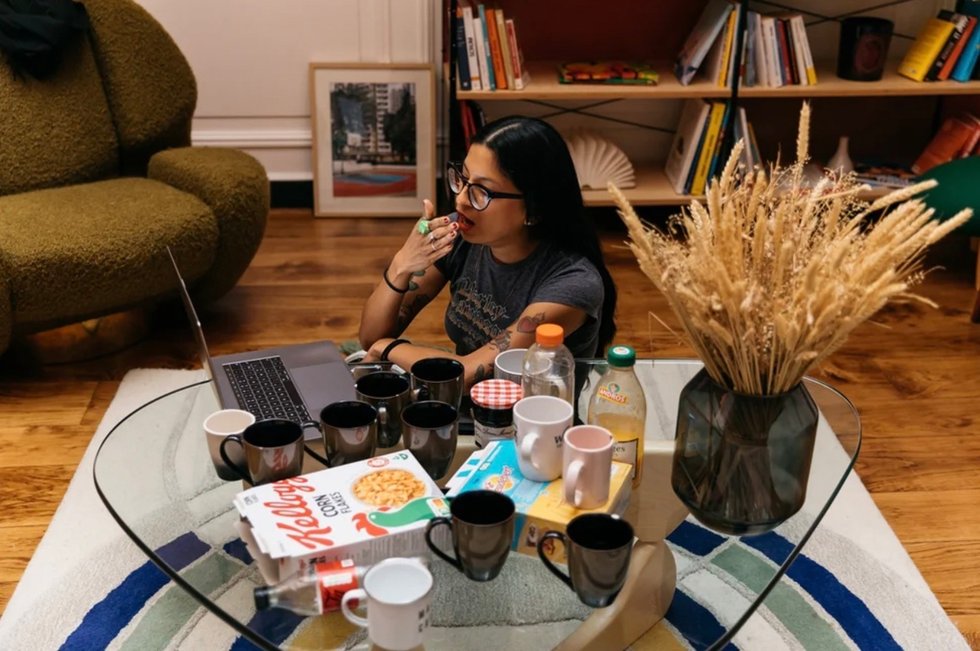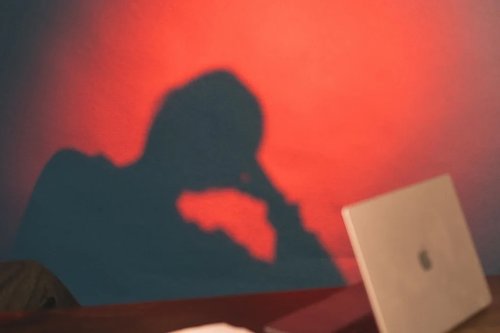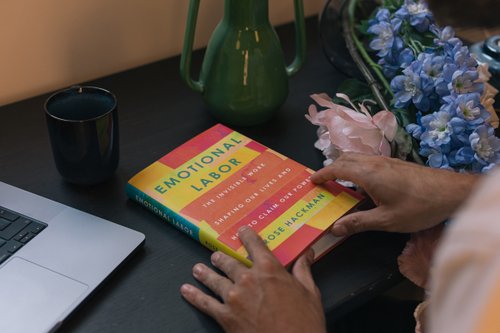Up all night: the complex relationship between work and insomnia
May 09, 2023
6 mins

JB
Writer, translator and journalist
Kelly White was on cloud nine when she landed her dream job, working as a full-time accountant for a government contractor. It was 2017, a year marked by this major milestone in her career. She was extra lucky — she loved both the job and her colleagues. Yet just a few months into the role, she noticed that her sleep was suffering. Some mornings, she headed into the office without having slept at all. Her mental health took a dive, and she began having panic attacks at work. White was suffering from the debilitating effects of insomnia.
According to the American Academy of Sleep Medicine, up to 35% of adults suffer from insomnia. Its symptoms and severity can vary;some people struggle to fall asleep while others have trouble staying asleep or just simply wake up too early. The effects of insomnia are also wide-ranging, as sleep can affect everything from cognition to performance, reaction time and mood. All of these diverse factors play into our work.
“With a lack of sleep, we can end up feeling more anxious than usual or becoming more snappy towards our co-workers,” says Dr. Deirdre Conroy, sleep psychologist and clinical director of behavioral sleep medicine at Michigan Medicine. According to Heather Darwall-Smith, sleep psychotherapist and author of The Science of Sleep, this relationship between sleep and emotions isn’t fully understood. She does note: “Research has shown that when we don’t get enough REM sleep [the sleep stage associated with dreaming], we may experience mood swings, irritability and increased emotional reactivity. So, our tolerance and our temper are tested.” She explains that this can obviously affect our interpersonal relationships at work and cause certain tasks to feel overwhelming. For White, this translated into guilt about why she couldn’t sleep or be “the best version” of herself.
Trouble disengaging
Our jobs, being such an important part of our lives, play an important role in both causing and alleviating insomnia. In fact, White describes how the pressure of her accounting job stoked the condition. At the beginning, she faced a huge learning curve, which fueled imposter syndrome. She also had to constantly rely on a network of people in order to complete her tasks. It all proved very stressful.
She admits that, despite loving her job and the company, “Some days it was really hard to leave these negative feelings at work. My poor husband would hear me complain about it all the time. Sometimes I would come home crying.”
This inability to switch off and disengage from work outside office hours is often cited as a major cause of insomnia. For Kasryn Kapp, a licensed professional counselor who specializes in sleep, this is a real problem in today’s digital world, where workers can receive emails late into the night and are often expected to be on call around the clock. “Cognitive behavioral therapy for insomnia (CBT-I) recommends an hour of winding down before going to bed But if you’re going to bed at 10 p.m. and receiving emails from your boss at 9:55 p.m. That’s going to make it hard.” This is one good argument for the “right to disconnect,” a global initiative to ban bosses from sending messages to employees outside working hours.
But according to Darwall-Smith, it’s a question of culture as much as policy, as lack of sleep is sometimes considered a badge of honor. “There is a sense of ‘you sleep when you’re dead’. Especially in senior roles and it’s very problematic.” This can ultimately make employees with insomnia feel unable to reach out for help. Darwall-Smith notes, however, that workers should still raise the issue as “they won’t be the only one in their organization.”
Working from home
Despite the many benefits WFH can have on employees’ mental health, it doesn’t always help those suffering from insomnia. Shortly after the pandemic began, people were forced to set up home working environments. Three years later, Conroy is still seeing patients who continue to work out of their bedrooms or even work on their beds. She argues that this leads to “complete integration between sleep and working,” which doesn’t facilitate sleep.
Kapp notes that part of CBT-I involves helping clients associate their bed with sleep, which requires not spending awake time in bed watching TV, looking at their phone or working on their laptop.
She cites Pavlov’s renowned psychological experiment on classical conditioning, where dogs were conditioned to associate a ringing bell with food, causing them to salivate whenever it was rung. Kapp says CBT-I techniques are similar: “We want the bed to be strongly associated with sleep, so that when you see it, your body starts to relax and prepare itself.” Kapp does recognize that, sometimes, working from a bedroom is inevitable (if you live in a studio apartment, for example). But she offers some advice: “If working from your room is an absolute must, at the very least, put a different colored blanket on the bed to signal that it’s awake time. Then take it off when it’s sleep time.”
Changing work schedules
The mere structure of our workday can also pose problems for sleep. For example, Darwall-Smith highlights how some people’s genetic body clocks may not be suited to waking up early, which immediately puts them under stress. She adds that people may also not be moving enough as they drive to and from work and sit at a desk all day under artificial light with no time for meals or exercise. “This creates the perfect storm for insomnia.”
In this context, Conroy says that WFH has actually allowed some people to improve their relationship with sleep as it’s given them more flexibility over their schedules. “If someone is more of a night owl, they can now sleep in until 08:59 am and have their first call at 9 am. It’s great because they don’t have to commute and this lessens the pressure to sleep.”
Other shifts in the way we work, such as the continued rise of freelancing, may also play into insomnia. “One of the tricky things about being freelance is the ebb and flow of work,” explains Darwall-Smith. “When you’ve got a lot of work, you tend to throw yourself into it, and a lot of things fall by the wayside. There’s either too much work or not enough work. How do you keep a balanced lifestyle?”
Kelly White sometimes finds herself living proof of Darwall-Smith’s analysis. Since leaving her full-time accounting job, she’s become a self-employed photographer. At times, this professional shift has caused her insomnia to flare up as her work is “now so much more personal.” But she also recognizes that, when she has lots to do, her sleep improves. “When I throw myself into my work, there are feelings of accomplishment. I’m really productive, which makes me feel good. So, insomnia gets better.”
Improving insomnia
Despite the varied causes and symptoms of insomnia, there are a whole host of techniques that can help alleviate the condition. It should be noted, however, that these tips aren’t a replacement for a doctor’s visit. It’s always best to check with your healthcare provider as insomnia can mask other health conditions.
Foremost, Kasryn Kapp stresses the importance of winding down before bed. This doesn’t have to mean doing yoga or meditating — it can simply be a menial task. “Folding laundry is great,” advises Kapp “There is no blue light from electronic devices, which can make you more alert. It’s boring. It’s a little bit relaxing. It helps us to wind down.”
It’s also crucial to monitor caffeine and alcohol intake in the hours leading up to bed, as “caffeine can have up to 9 hours of half-life,” according to Kapp. Similarly, she explains that alcohol can prevent us from getting restful sleep as the body is only “drunkenly sleeping while processing alcohol.”
Examine your habits
If you’re suffering from a period of acute insomnia (lasting over the course of a few weeks), Dr. Conroy recommends examining any recent changes in lifestyle or habits. “The first thing is to check what you’re doing,” she advises. “Have you changed any of your habits? Your sleep schedule? Your eating patterns? What you’re eating? Are you taking any medications which may have alertness or sedation as a side effect?” She also recommends looking into sources of stress in your personal or professional life: “So often, anxiety can be a trigger for insomnia.” Because of this, many suffering from insomnia can benefit from having therapy. It’s the treatment that helped White — she began therapy in 2022 and found it helped, in part because she was finally able to address the negative thoughts surrounding her insomnia. It also helped her find new coping mechanisms.
For Darwall-Smith, one of the keys to tackling insomnia is to focus on routine. She recommends waking up at a fixed time every day, even on weekends. She also talks about the potential benefits of sleep compression, a CBT-I technique which aims to limit the window for sleeping so that it matches the body’s ability to sleep. “We squeeze the opportunity for sleep so that the body consolidates sleep into that time,” she notes. “Then, as insomnia starts to improve, we start to open up that sleep window so you get a little more.”
The paradox
One of the major issues with insomnia is that it can create a state of constant stress as the person worries about the next night’s sleep as soon as they wake up — and continue throughout the day. “This actually pushes the stress response up,” says Darwall-Smith, “The thing we need to focus on is how to bring the stress response down because sleep then follows.”
Conroy echoes this advice, pointing out that those who suffer from insomnia often curate their life around sleep. They may avoid going out at night, or spend endless hours in bed. And yet, “the paradox of insomnia is that the harder you try to sleep, the worse it can become.”
“Sleep is like breathing,” says Darwall-Smith. “It’s a biological fact. Your body does know how to do it. Some nights are good. Some nights are bad. Some nights are shocking. Some nights are awesome and that’s how it goes.”
Photo: Welcome to the Jungle
Follow Welcome to the Jungle on Facebook, LinkedIn, and Instagram, and subscribe to our newsletter to get our latest articles every day!

More inspiration: Mental health

‘We need each other’: Monika Jiang on combating loneliness in hybrid work
Hybrid work offers flexibility but can leave us feeling disconnected. Monika Jiang explores how we can rebuild workplace connections.
Dec 19, 2024

Struggling at work? Here are 3 steps to rebuilding your self-esteem
Low on confidence? Learn how reflection, recharging, and refocusing can help you rebuild self-esteem and thrive professionally.
Nov 27, 2024

10 ways to beat the Sunday Scaries
Even people who love their jobs can experience the Sunday Scaries. Psychologist Karen Doll offers several strategies to help manage and overcome it.
Sep 12, 2024

Unpacking the burden of emotional labor
Rose Hackman’s "Emotional Labor" reveals how managing emotions impacts everyone, especially women and minorities.
Aug 08, 2024

Is financial anxiety harming your productivity?
Feeling overwhelmed by financial anxiety? You're not alone. Discover practical steps and expert advice to regain control of your work-life balance.
Jul 31, 2024
The newsletter that does the job
Want to keep up with the latest articles? Twice a week you can receive stories, jobs, and tips in your inbox.

Looking for your next job?
Over 200,000 people have found a job with Welcome to the Jungle.
Explore jobs